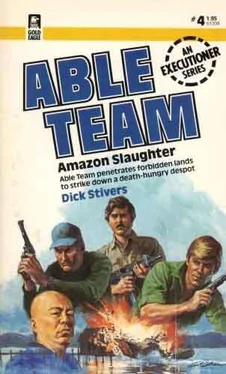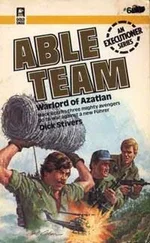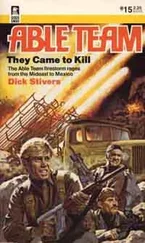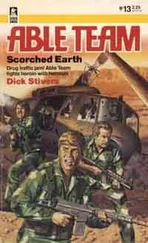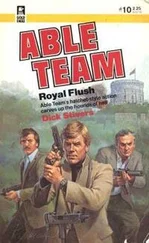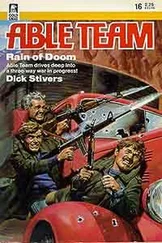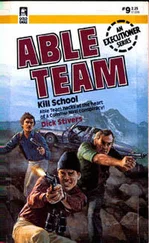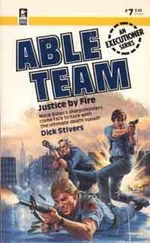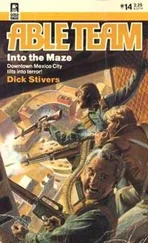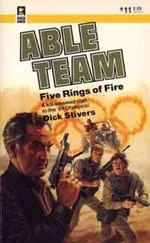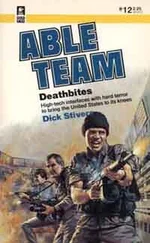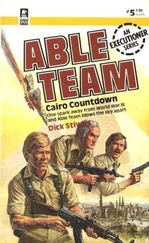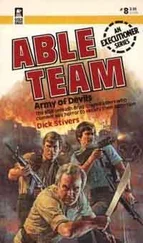Communism could not hope to gain world dominance through economic force, he explained. All Communist states went bankrupt shortly after their revolutions. Slave labor by millions of political prisoners succeeded in maintaining a facade of progress, but executions and mass death soon depleted the legions of slaves. China and Vietnam had followed Stalin's methods of economic advancement and met with the same inevitable collapse.
But terror promised easy victory over the bourgeois democracies of the West. Europeans and Americans lacked the will to endure the slightest inconvenience. If an elected president or prime minister failed to maintain an ever-rising standard of living, the voters found another face and voice to speak from their televisions. If a war conflicted with the hedonism of the youth, millions marched on the capitals, demanding an end to their nations' involvement, regardless of the consequences. How would these same 'citizens respond to a war without frontiers? A war threatening every citizen with death at any moment? How many casualties would they suffer before they demanded peace at any price? Before they accepted any government? Any regime?
The weapons of this war would be compact atomic bombs. If small enough to be concealed in an automobile, Chinese — or American or European — fanatics could place the weapon in the center of any city. The Gang of Four could extend their rule to all the decadent societies of the West. The Gang of Four commanded their scientists to produce the necessary bombs.
After Mao's death, as Wei Ho prepared to attack the world's democracies, popular forces in the Communist Party, enraged by the chaos of the Cultural Revolution, attacked the Gang of Four. Jiang Qing and her clique disappeared into prison. Thousands of their obsequious followers faced firing squads. Pragmatists purged the fanatics, redirected the resources of China to improving the lives of its people. The Peoples' Paradise professed Marxism, yet practiced socialism heavily laced with private enterprise.
Endless interrogation and torture broke the Gang of Four. Before following their lackeys to the execution wall, the members of the clique dictated thousand-page confessions, exposing the shadowy Wei Ho to the light of People's Justice.
Wei Ho fled China with a freight train of gold. He took sanctuary first in Cambodia as the Communist Khmer Rouge decimated their population in their drive to create a Marxist fantasy land. That horror brought economic collapse and nationwide starvation. Seeing the opportunity for quick conquest, the Vietnamese invaded. Wei Ho fled again. With a personal guard of Cambodian mercenaries, he escaped through Laos to northern Thailand, then to Burma.
He did not forget his plans for world power. In the years of his pupil's marriage to Mao Tse-Tung, when Wei Ho had ruled China through Jiang Qing, his power over the nation had been subtle yet absolute. The old warlord of drugs and prostitution lost the chance to be Emperor of the World only by a factional clash within the Communist Party.
From the mountains of Burma, with tons of gold and a mercenary army, he again plotted nuclear terrorism. His researchers found an unmined and unprotected deposit of uranium in the Andes mountains of Bolivia. His spies in the Free World's atomic industries learned of a brilliant nuclear physicist who suffered from narcotic addiction. Wei Ho's gold bought technicians who would go anywhere, serve any employer. International terrorist groups received word of opportunities for trained, disciplined soldiers.
The Empire of Wei Ho rose from the Amazon.
"Holy goddamn," Gadgets swore. "The Atomic Yellow Peril."
Lyons stared out at the moonlit rain forest floating past them, alone with his thoughts. Shirtless, his upper body black with genipap, he wore his gray combat pants to cover the bandage on his piranha wound. Blancanales flicked the rewind switch of the tape unit and listened to snatches of the Stony Man C1A-NSA report. After a few replays, he let Gadgets tape his acknowledgment and outgoing report. Passing the signal through the scrambler, Gadgets transmitted the message in a highspeed screech of electronic noise.
Looking aft, Blancanales checked the river. The patrol boats towed the paddle-wheeler backward downstream. Brazilian farmers in army uniforms manned the helms. If observed from the air, the men and boats would appear to be slaver-commanded.
Hammers rang on sheet metal, power drills whined as the ironsmith and his helpers fabricated boiler-plate armor for the PT boats' gunners. Other men on the paddle-wheeler's cargo deck gave the aluminum dinghies and canoe a last coat of black paint. In the ship's cabins, the Indians caught a few hours' sleep before the assault on the slaver camps.
A hand radio squawked. Gadgets monitored a report to Lieutenant Silveres from the work crew returning with the weapons and cruiser captured from the slavers.
After the Portuguese-speaking settler cut off, the lieutenant translated.
"They have the weapons. They come downstream. No problems."
"At dawn." Lyons finally spoke. "At dawn we hit them. Like this."
Spreading out paper on a table stained by the blood of the captain, Able Team plotted the destruction of Wei Ho.
* * *
Only an hour remained until the first gray light of dawn. Mist swirled around the lights of the ancient vessel. Carl Lyons, Pol Blancanales and Gadgets Schwarz stepped from the rail of the paddle-wheeler's cargo decks to the decks of the patrol boats and the captured slaver cruiser.
Gadgets and Blancanales checked the mountings of the heavy weapons on the cruiser, congratulating the workmen on their quick installation. The slavers' cruiser/troop boat now carried two M-60s and two MK-19 40mm full-auto grenade launchers. A group of Brazilian settlers, some of the men army veterans, manned the weapons. Lieutenant Silveres, weak but able to translate, would man the ship's communications, monitoring the slaver transmissions and relaying radio instructions from the assault force to his gunners.
On one of the patrol boats, Lyons moved through the assembled Indian warriors in a last check of their weapons and spirits. They laughed and joked with him, flourishing their Remingtons and G-3s. He counted their bandoliers of 12-gauge shells, mentally calculating their rate of fire versus the ammunition they carried. He knew this would be their heaviest action yet. Then he saw some men packing nylon rucksack, heavy with double-ought shells.
They knew what they were up against, Lyons nodded to himself. No doubt about it.
The black-painted men inspected him also, joking to one another, touching the battle rig Lyons wore. Still shirtless, his body blacked with genipap, he wore all his weapons: the shoulder-holstered Python, the Beretta, the Atchisson slung over his shoulder. Bandoliers crossed his chest, making him look like a Mexican bandit. His radio hung on his Beretta's web belt with magazine pouches. A fragmentation grenade weighed down each thigh pocket. He wore his black-canvas-and-nylon jungle boots, a double-edged fighting knife taped inside his left boot top. He moved slowly with the weight of the weapons, the deck creaking under his boots.
"Boats look good," Gadgets called across to him. He pointed at the black dinghies and canoe bobbing beside the PT boat.
"Tell those farmers one last time," Lyons shouted. "No heroes, no widows. They stay safe. We promised their wives."
Lieutenant Silveres called out to the farmers on the other two patrol boats. Workmen had added steel gunner shields and an extra M-60 to each of the fast fiberglass boats. The men shouted out answers. "They understand."
"Then let's move!"
Motors rumbled, coughing puffs of black diesel soot into the night. Wives and families and friends called out from the rails of the paddle-wheeler and waved as the four river craft pulled away. In a minute, they left the voices and waves of the people far behind.
Читать дальше
